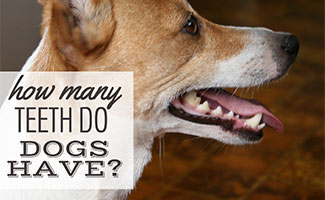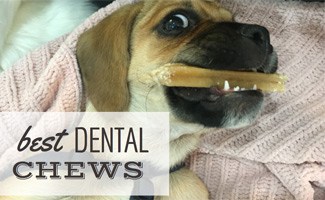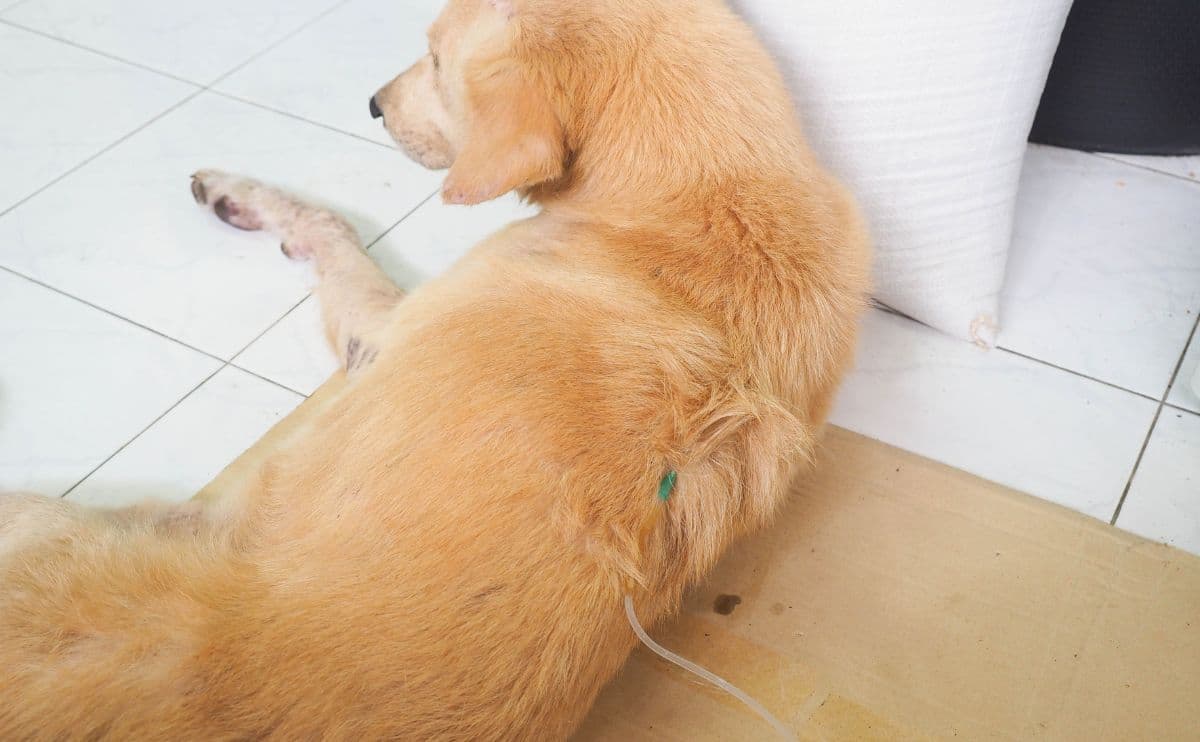When you purchase through links on our site, we may earn a commission. Here’s how it works.

Teeth are essential to your dog’s body and play a significant role in their health. When dogs have healthy teeth, they can get the nutrients their bodies need to stay healthy and strong. When their teeth aren’t healthy, it affects total body health and can cause discomfort. Like us, dogs can get a tooth infection, which can be an excruciating, painful problem. A dog tooth infection is not something to ignore, and owners will need to seek veterinary care.
Do you know how to check your dog’s teeth for an infection?
- What Are Some Common Dog Teeth Problems?
- Why Is My Dog Losing Teeth?
- How Can I Tell If My Dog Has Tooth Pain?
- Does My Dog Have Rotten Teeth?
- Are Bad Teeth A Genetic Issue For My Dog?
- Can Bad Teeth Cause Other Health Concerns?
- Treatment Of Dog Tooth Infection: Root Canal Or Tooth Extraction
- Comfort Care During An Infection And After Treatment
- Prevention Of Tooth Infection
- Dog Tooth Infection And Dental Checks
- Annual Checkups For Your Dog's Physical And Dental Health
What Are Some Common Dog Teeth Problems?
You may encounter a few common problems with your dog’s teeth.
- Broken Teeth: Dogs can break their teeth during trauma or by chewing on hard things. Without treatment, a broken tooth can lead to an infection.
- Gum Disease: Gingivitis and periodontal disease are two of the most common tooth problems dogs experience. Gingivitis can progress to periodontal disease, causing bone and tooth loss.
- Loose Teeth: Teeth can become loose from trauma or infection. Loose teeth can become lost teeth without intervention.
- Tooth Decay: Cavities can lead to rotten teeth or a tooth infection. One affected tooth can lead to many if prompt treatment is not given.
- Tooth Infection: A tooth infection or tooth root abscess can be hazardous and painful for your pup.
According to the Cornell University College of Veterinary Medicine, 80 to 90% of dogs over 3 years old have developed some aspect of periodontal disease. It is more prevalent in smaller breeds and older dogs but can affect all breeds.
Why Is My Dog Losing Teeth?

All dogs lose teeth. But it’s only normal to lose teeth when your dog is a puppy. If adult teeth fall out, that’s usually a sign of trauma, gum disease, or infection. It’s helpful to understand how many teeth dogs have and standard eruption patterns so you know what to expect.
How Can I Tell If My Dog Has Tooth Pain?
Unfortunately, your dog can’t tell you if his tooth is hurting. If you notice any of these signs, your dog could be experiencing tooth pain:
- Not eating as much as usual
- Whining during meals
- Only chewing on one side
- Stops eating in the middle of a meal
- Spits out food
Does My Dog Have Rotten Teeth?
“Rotten teeth” seems to be a catch-all term. This term describes not only a dog tooth infection but also broken teeth, teeth with cavities, and a mouth with gum disease. When you look in your dog’s mouth and see broken teeth, black spots, holes, and bad breath, your dog likely has a dental problem.
Are Bad Teeth A Genetic Issue For My Dog?

Some dogs are more likely to have bad teeth because of their breed. For instance, Pugs, Shih Tzus, Bulldogs, and Boston Terriers are all known to have teeth that don’t line up correctly, a condition called malocclusion. This issue puts these dogs at a higher risk for gum disease. Even though tooth decay or cavities are rare for dogs, Shepherd dogs get cavities more frequently than other breeds.
It’s essential to understand your pup’s dental concerns based on their breed genetics. And, if your dog’s breed is prone to dental concerns, you might want to consider getting pet insurance with good dental coverage to help manage the finances as they age.
Can Bad Teeth Cause Other Health Concerns?
An infection in a dog’s mouth can cause them to be more susceptible to other health conditions. Gum disease is a precursor to heart disease and complicates diabetes. If a tooth gets infected and goes untreated, that infection can spread to the nose, eyes, and even the bloodstream, infecting the entire body.
Signs And Symptoms

Here are some signs and symptoms you may notice if your dog has bad teeth or mouth pain.
- Bad breath
- Bleeding gums
- Drooling
- Inflammation and swelling around the tooth
- Loose teeth
- Nasal drainage
- Not eating
- Pain
- Swollen face
- White drainage or pus
Causes Of Dog Tooth Infection
A tooth infection can occur when bacteria get into the center of the tooth, known as the tooth’s nerve canal. The bacteria enter a tooth when it’s broken, cracked, or has a cavity. When an infection is severe and left untreated, it can lead to death.
Treatment Of Dog Tooth Infection: Root Canal Or Tooth Extraction
If your dog has an infected tooth, you only have two options:
1. Root Canal
Dogs can develop a tooth root abscess. A tooth root abscess can sometimes be so severe it needs extraction. A root abscess in dogs may need to be treated by draining the abscess and performing a dog root canal to save the tooth. This procedure needs to be done by a veterinary dentist. The process removes the nerve of the tooth and then seals the tooth. It allows your dog to keep his tooth and stops the pain and infection.
2. Extraction
Tooth extraction is the process of removing a tooth. It removes the infection and stops the pain, but the tooth is gone. It’s a less expensive option.
Your vet may prescribe an antibiotic to get the infection under control before treatment can occur.
Treating your dog’s tooth infection can be costly. You may want to explore which pet insurance company offers the best dental coverage to ease the pain from this and other unexpected future vet expenses.
Comfort Care During An Infection And After Treatment
Food

Dogs with bad teeth need soft food to help them get the nutrition they need without feeling pain. This becomes more important when your dog is healing after a tooth extraction or with older dogs who need good nutrition for their body health. Choosing a natural product, like one of these high-quality dog foods (available for delivery), can help you get the most nutrients out of every bite.
Cleaning
It’s best to continue to clean your dog’s teeth during this time. However, it helps to be gentle around tender areas and ensure you understand your vet’s instructions for dental cleaning after treatment.
Pain Relief
If your dog’s teeth are causing him pain, you’ll want to talk to your vet about relief through pain medication. Generally, medications made for humans are not safe to give to dogs. Our experts review the options and even some natural choices in our article on the best pain meds for dogs.
Older Dogs Need Extra Love
When you have an older dog, you may need to put extra effort into their teeth. Checking and brushing your pup’s teeth daily will help you identify issues early and keep your dog’s teeth healthy and strong. Strong teeth ensure that your older dog eats nutritious foods that keep his body healthy.
Prevention Of Tooth Infection

A good oral care routine is the best way to prevent tooth infections and rotten teeth. Our experts have many tips for brushing your dog’s teeth and finding the best dog toothpaste. It’s important to know that most veterinarians recommend brushing your pup’s teeth daily to prevent many dental problems.
You can also help keep your dog’s teeth healthy and strong by giving them dental chews, rawhide bones, or safer rawhide alternatives. Just make sure you understand how to use them safely. This includes keeping in mind that natural bones are hard enough to fracture your pup’s teeth.
Remember that mouth pain is not always related to dog tooth infection or dental disease. It can be a sign of oral cancer (mouth cancer), broken teeth, or even a jaw fracture. Always pay attention and seek veterinary care if your pup has mouth pain, especially if you cannot identify the cause.
Dog Tooth Infection And Dental Checks
This two-minute video from VCA Animal Hospitals (originally Veterinary Centers of America Inc.) addresses tooth infections and why a vet should check your dog’s mouth every year.
Annual Checkups For Your Dog’s Physical And Dental Health
Annual checkups help you stay aware of what’s going on with your dog’s health. Your veterinarian will check your dog’s total body health, including his dental health. Be sure to check out our article on the importance of an annual dog checkup to learn more about this essential yearly visit with your vet.
Tagged With: Dental

